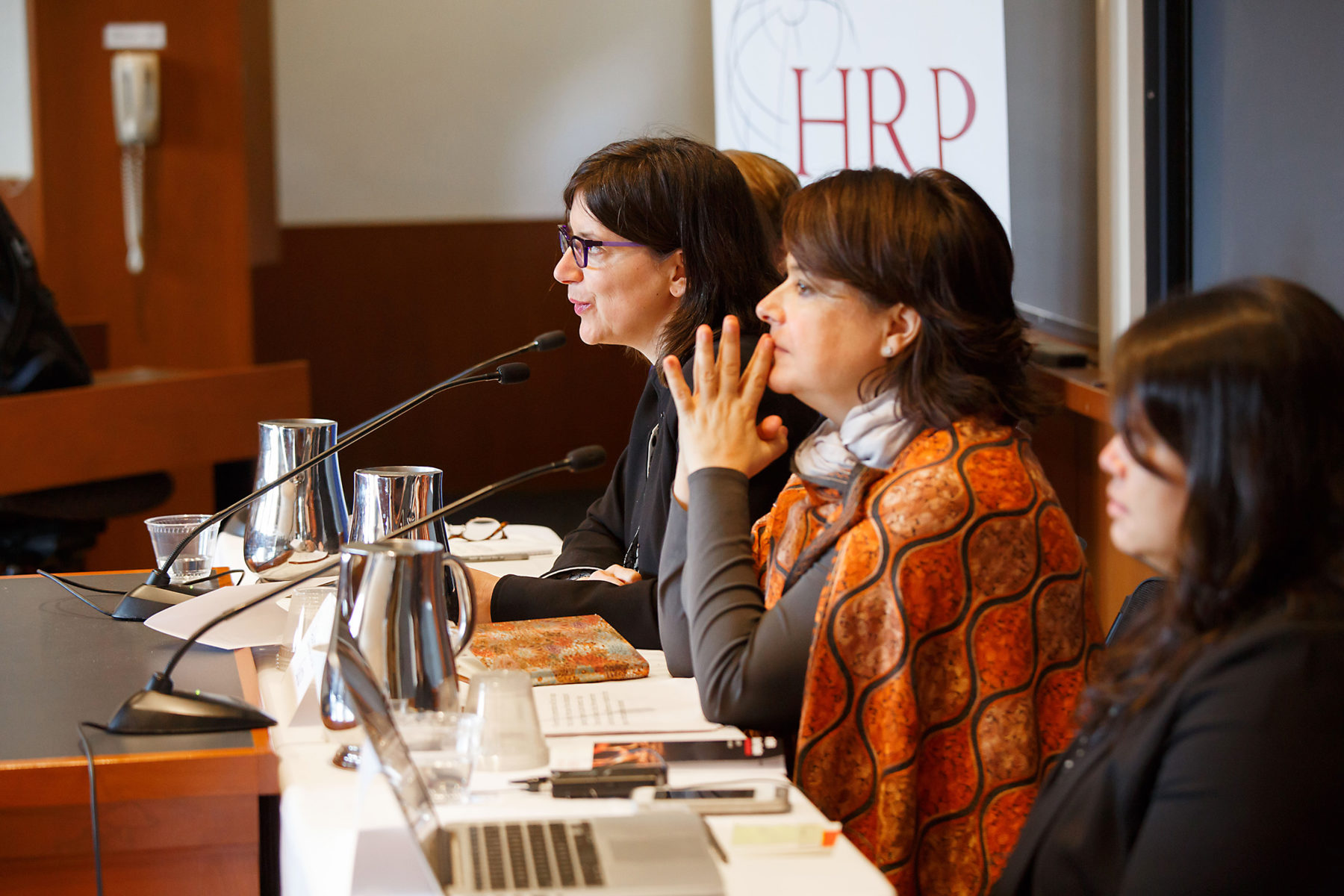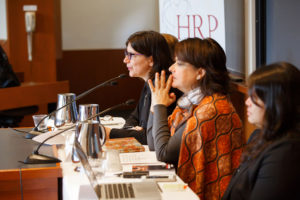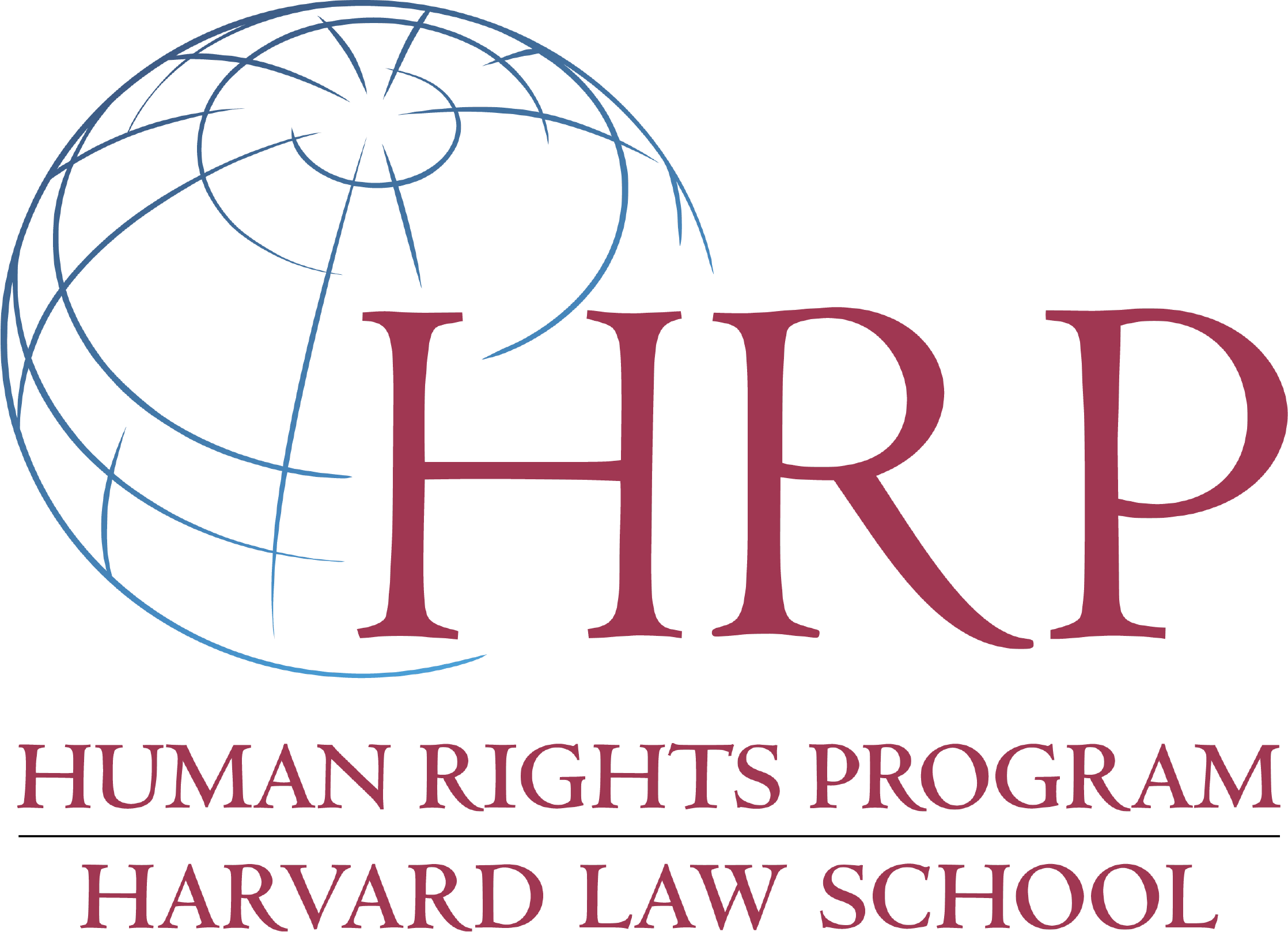
Spotlight Feature: HRP’s “Human Rights in a Time of Populism” Conference
This piece originally appeared as the spotlight feature on Harvard Law School’s homepage.
The global impact of populist movements was the topic of a two-day symposium, “Human Rights in a Time of Populism,” that was held on March 23-24 at Harvard Law School. The Human Rights Program organized the conference under the leadership of its co-director, Gerald L. Neuman, J. Sinclair Armstrong Professor of International, Foreign, and Comparative Law.

Friday’s two panels, “Populism and its Causes” and “Populism and its Effects: The United States and Poland,” brought together a team of faculty and international experts to discuss the direct and indirect effects of this worldwide and largely right-wing phenomenon.
“This will not be the most cheerful conference I’ve attended,” noted former HLS Dean Martha Minow, who moderated the second panel. The speakers looked at populist movements including the rise of Donald Trump in America, Jarosław Kaczyński in Poland, and Viktor Orban in Hungary, and found that each shared similar xenophobic tendencies and anti-elite rhetoric.
At the opening of the first panel, Peter A. Hall, Knapp Foundation Professor of European Studies at Harvard, said that populism is a hard term to define, but pinpointed what it means in the current climate: “I would define populist candidates as ones with a distinctive set of appeals; those who claim to speak for a broad people whose voice is said to be ignored by a political elite that is presented as corrupt or incompetent.” By this standard, he said, Donald Trump would be defined as a populist while Bernie Sanders, though a radical critic of capitalism, would not.
Hall asked the underlying question: Why this movement, and why now? One answer, he said, is the sense of the middle class being “left behind,” socially and economically marginalized. “If the root cause of discontent lies in the disappearance of decent jobs, and I think it does, remember that public policies such as minimum-wage laws can make existing jobs more decent.” Instead, he said, modern populists have moved the focus to social issues such as immigration. “Centering political competition around values issues makes a perfect storm for populist candidates.”
Stephen Pomper, the Director of the International Crisis Group’s U.S. program and a veteran of the Obama administration, said that human rights foreign policy initiatives are difficult to enforce in the best of times—and that this is definitely not the best of times. Obama, he said, was criticized for being soft on abusive regimes, but he still had a human rights policy that he tried to implement. “What’s most jarring about the Trump administration is that it has called the ideals themselves into question. He ran as a candidate on the presumption that Washington and foreign elites cooked up deals that were harmful to ordinary Americans. Now we are being driven by economic nationalism, immigration restriction, and a robust militarism that may not be about getting into wars but threatening them.” The silver lining, he suggested, is that many of Trump’s staff actively disagree with him—but this hardly bodes well for human rights initiatives.
HLS Professor Matthew C. Stephenson examined the role that corruption—or sometimes, just the perception of corruption—plays in the rise of such movements. In some cases, he said, a regime change results when actual systematic corruption is exposed; Italy’s “Mani pulite” (“clean hands”) investigations, which led to the collapse of its center-left and center-right parties in the ‘90s, is a notable example. But more recent populists, including Trump and Orban, have campaigned on the idea that the existing elite is corrupt, without necessarily providing evidence. Thus, said Stephenson, “Corruption itself can open the door for an insurgent populism, but anti-corruption rhetoric can do the same thing.”
The paradox, he noted, is that the new leaders maintain their popularity when they themselves are revealed to be corrupt. “Why doesn’t this behavior alienate supporters of the populist movement more? One hypothesis is that the rhetoric of corruption wasn’t really what they were appealing to; it was more a code word for ‘Defeat cosmopolitan snobs taking your jobs.’ Another possibility is that even though voters don’t like corruption, they dislike moralists even more. Berlusconi in Italy and Trump in America are seen as living the dream. [Voters] admire the charismatic populist leader, and take attacks on the leader as attacks on them.”
HLS Professor Ruth L. Okediji examined populist trends in sub-Saharan Africa. Although in some countries democracy may seem stable on the surface—as reflected in this month’s famous handshake between Kenyan President Uhuru Kenyatta and his political arch-rival Raila Odinga—tensions are likely growing beneath. “The deep dissatisfaction that fuels populism is a strange thing to see in the African context, because economic insecurity has long been the status quo. But there is something different about the current state of economic anxiety.” She warned that the insufficient emphasis of the human rights movement on realizing economic, social and cultural rights has contributed to the success of populist leaders who claim to provide economic benefits for their own constituencies, instead of a pluralist democratic system serving the good of all.
According to Wojciech Sadurski, a visiting professor at Yale Law School, the recent right-wing power grab in Poland is the most puzzling of all. “There is no reason that democracy should have failed in Poland. None of the common factors apply, not even [the presence of] oil.” Yet, he said, Kaczyński’s Law and Justice party was able to rise through a familiar populist formula. “What he did was to package together xenophobia, an anti-elite type of rhetoric, and a sense of cultural distance from modernism—LBGT, the Green movement, etc. By being able to present this package as logical and serious and responding to certain anxieties in society, he managed to create a backslide in a society where it should never have happened.” Poland, he said, is already feeling the effect on human rights, particularly in the courts. “They are now used as an instrument of the government, to fight its opposition. Yet because those changes maintain the façade of the institution, they are less visible to outsiders.”
One way forward, suggested Douglas A. Johnson of the Kennedy School, is a return to the more traditional definition of populism: A movement of the people. “Even if the public prefers stricter gun control or universal healthcare, those are difficult things to make happen. In public-good situations, this only happens when there is a strong sense of moral urgency that keeps a social movement at play.” Thus, he suggested, the best solution may be a return to old-fashioned activism. “Historically, populism has created agendas that forced elites to make changes. You can’t create a movement unless you have an adversary.” And he recommended that future populists learn the art of political messaging. “What moves things forward is a language, often an emotional language. I think it’s important that the human rights movement embraces that.”
Pomper also suggested that the best antidote to populism may be a more enlightened populism. “We’re not headed into a good space in the next couple years,” he said toward that panel’s end. “But it’s important that the community who cares about these issues figures out what their approach is going to be.”
The conference continued on Saturday with panels on populism in Southeast Asia, Turkey, and Latin America. It then turned to lessons learned for human rights regimes, and how to address the effects of populism. Some of the speakers on Saturday included Jeremy Waldron, Michael Posner, T. Alexander Aleinikoff, Richard J. Heydarian, Jamie O’Connell, and Anna Crowe.
